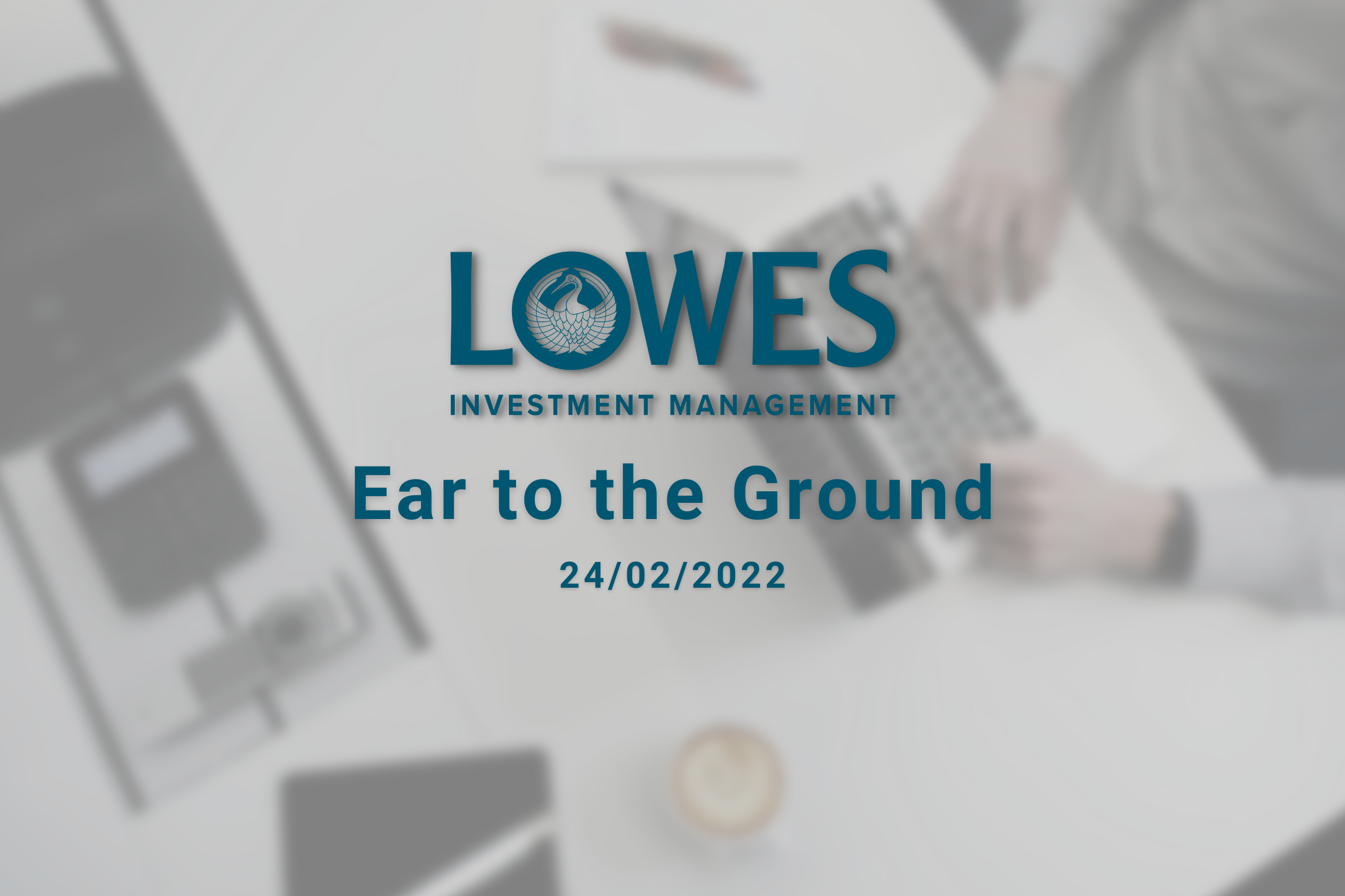Ear to the ground
24 February 2022

Unfortunately the main news this week is the very sad events which are now developing in the Ukraine. I think we are all aware of what is now happening so I won’t look to go into detail. The UK, EU and the US began with a round of sanctions as their initial response and it is likely that these will be ramped up further, with the reach of sanctions likely to go further across the world.
Equity markets have understandably reacted negatively this morning, with the FTSE 100 down over 3% and the Euro Stoxx 50 down c. 4%. This morning the Nikkei ended down 1.8% on the day, the Hang Seng 3.2% and the Sensex down 4.7%. Unsurprisingly we have seen gilt and US treasury bond yields fall as defensive plays.
There will undoubtedly be concerns as to what this and a further round of sanctions will mean for the inflation and economic growth outlook. As we write we have already seen oil move above $100 a barrel and gas prices are also on the rise, although the latter was already the case after Germany refused to sign off on Nord Stream 2, the new gas pipeline from Russia to Germany.
This is unsurprising given the contribution to global energy production which Russia makes. According to figures from BP, EIA, Refinitiv Datastream and JP Morgan, Russia accounts for in excess of 15% of world natural gas production and c. 13% of the crude oil production. If this becomes a protracted affair there is a chance that we will have to live with higher inflation for longer as higher energy costs feed into headline inflation indices.
It is not just oil and gas however which Russia plays an important part of, in terms of commodity production. They are also large suppliers of fertilizer (potash) at c. 16% of global supply, platinum in excess of 12%, nickel in excess of 9%, and also wheat, to name but a few. Given these statistics it may be that we see an element of stocking on a short term time frame.
The potential for higher inflation for longer, along with the potential for slower global growth, potentially raises the potential for stagflation. This event therefore may make the decision making for the central banks more difficult, making the possibility of a policy mistake greater. Whilst policy makers will be aware that they still need to tackle the higher inflation which we are already seeing, through higher interest rates and reducing the size of the balance sheet, they will also be aware that global growth has shown signs of slowing.
We still know little about the true intentions of Russia or indeed the severity of sanctions which are undoubtedly about to be handed to Russia from the rest of the world. For now it is really a case of we need to see. Looking back at previous equity market returns following the start of an invasion we can see that the market, in this case the S&P 500, has typically recovered quickly. It is perhaps too early to tell if this will be the case this time.
For now we have the S&P 500 moving into correction and the Nasdaq close to bear market territory. The former closed at 4,796.56 on the 03 January 2022 whilst at the time of writing it stands at 4,188.07, a fall of 12.7%. The Nasdaq meanwhile has fallen from a closing level of 16,057.44 on the 19 November 2021 to 13,027.57 as we write, a fall of 18.87%.
Prior to the conflict commencing the market, according to the Chicago Mercantile Exchange, on the 18 February there was a 100% chance that we would see four interest rate hikes by the end of the year in the US, 95% chance we would see five hikes and 77% six hikes. Whether the magnitude of these rate rises will be delivered remains to be seen.
This article is for information purposes only and should not be construed as advice. We strongly suggest you seek independent financial advice prior to taking any course of action.
The value of this investment can fall as well as rise and investors may get back less than they originally invested.
Past performance is not necessarily a guide to future performance.
The Fund is suitable for investors who are seeking to achieve long term capital growth.
The tax treatment of investments depends on the individual circumstances of each client and may be subject to change in the future. The above is in relation to a UK domiciled investor only and would be different for those domiciled outside the UK. We strongly suggest you seek independent tax advice prior to taking any course of action.
Subscribe Today
To receive exclusive fund notifications straight into your inbox, please complete this form.